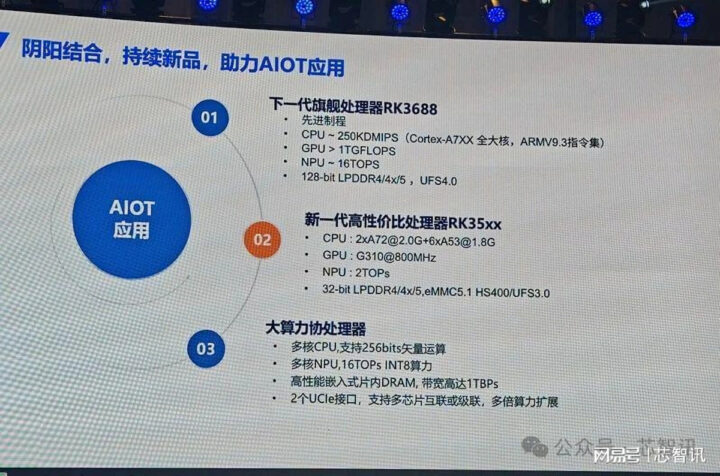Rockchip has unveiled the RK3688 AIoT SoC with Armv9.3 Cortex-A7xx cores delivering up to 250K DMIPS (RK3588 delivers 93K DMIPS), a 1 TFLOPS GPU, and a 16 TOPS NPU.
The new processor succeeds the Rockchip RK3588 octa-core Cortex-A76/A55 first announced in 2019, and also features a 128-bit LPDDR4/4x/5 memory interface, and a UFS 4.0 storage interface.
That’s about all we know about the RK3688 right now, but we can also deduct it’s probably based on a new, yet-to-be-announced Arm Cortex-A7xx core, possibly named Cortex-A730 or Cortex-A735, because no Arm cores have been announced with the Armv9.3 architectures. The Arm Cortex-A725 CPU core unveiled last May still relies on Armv9.2, and I’d expect new Arm cores to be introduced within the next few months unless Rockchip made a mistake in the presentation slide above.
Two other platforms were also announced at the same time starting with a new entry-level/mid-range RK35XX octa-core processor with two Cortex-A72 cores and six Cortex-A53 cores, an Arm Mali G310 GPU, a 2 TOPS NPU, plus LPDDR4/4x/5, eMMC 5.1, and UFS 3.0 memory and storage interfaces.
The third part is an unnamed high-performance co-processor featuring a CPU handling 256-bit vector instructions, a 16 TOPS NPU, and high-performance on-chip DRAM with a bandwidth of up to 1TB/s (or is that 1Tbps?). The chip also features two UCIe interfaces for multi-chip interconnection so I suspect it is for datacenters.
Back to the RK3688 processor. I first found it through a post on X by Radxa who plans to design the ROCK 6 SBC based on the new Armv9 SoC. Min.news also published the slide and some basic details about it and mentioned the processor is expected to launch next year. However, based on my experience covering semiconductor news, it may be an overly aggressive schedule, and I would only expect it in 2026. Time will tell.
Thanks to Paul for the tip.

Jean-Luc started CNX Software in 2010 as a part-time endeavor, before quitting his job as a software engineering manager, and starting to write daily news, and reviews full time later in 2011.
Support CNX Software! Donate via cryptocurrencies, become a Patron on Patreon, or purchase goods on Amazon or Aliexpress





